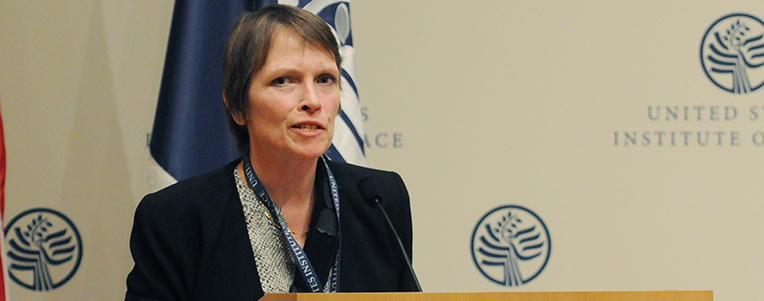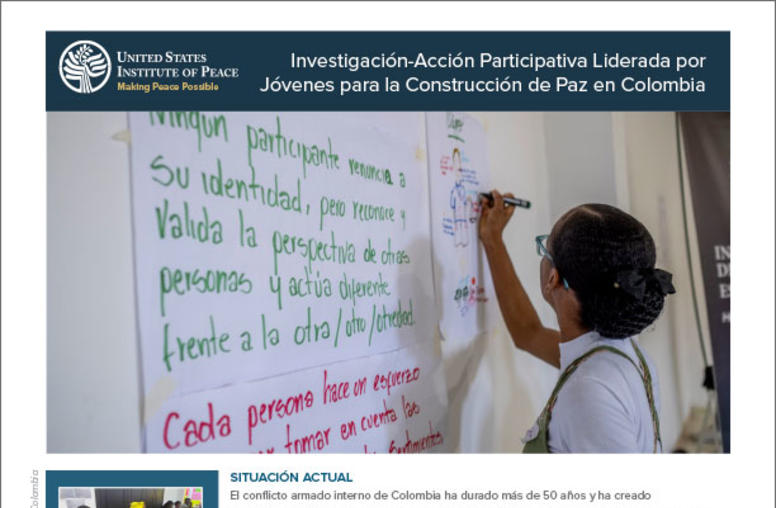Land, Conflict, and Peace in Colombia
An Interview with USIP's Virginia Bouvier
USIP’s Virginia “Ginny” Bouvier discusses the connection between land, conflict and peace in Colombia.

Since the passage of Colombia’s 2011 Law for Victims and Land Restitution, April 9th is mandated as National Victims’ Day in Colombia. What are you hearing from Colombia?
On April 9, President Juan Manuel Santos and Bogota Mayor Gustavo Petro initiated one of seven marches in Bogota to honor Colombia’s victims and to support the peace process currently under way in Havana. Departing from Bogota’s Center for Historical Memory, the two leaders were accompanied by some 200,000 people, according to Bogota police figures. Thousands of Colombians congregated in other parts of the city and throughout the country as well to show their support for the peace talks.
Last week USIP held a conference on Land and the Peace Agenda in Colombia. Why is land key to the resolution of Colombia’s conflict? What sort of land disputes, broadly, have driven conflict in Colombia, and how has this tended to play out in the government-FARC struggle?
Colombia’s conflict has been marked by massive displacement, so providing reparations and restituting lands to those who were forcibly displaced will be an important step toward the reconciliation of the country. This is one of the issues that the Law of Victims and Land Restitution addresses. In addition, the land issue in Colombia is central to the conflict’s origins. Colombia’s largest guerrilla group, the FARC-EP, currently engaged in peace talks with the Colombian government, was one of many Latin American guerrilla groups that emerged in the 1960s in response to widespread poverty and tremendous economic and social inequity. Entrenched rural elites responded to the guerrillas’ call for land reform by forming private armies—so-called paramilitary self-defense forces in Colombia—that relied on public security forces and regional politicians to protect the interests of large landowners. In recent decades, conflicts over land have become intertwined with the drug trade and extractive industries as well. Today, guerrilla insurgents, paramilitary groups, drug traffickers, agro-industrialists and the State battle for control of land, natural resources, and geostrategic corridors. They have forced the displacement of five million Colombians and the evacuation of an estimated 20 million hectares of land, and produced a “reverse agrarian reform” that concentrates half of Colombia’s land in the hands of only one percent of its population and consolidates one of the most inequitable land tenure systems in the world.
How central or pivotal is the resolution of land disputes to bringing a long-term end to the struggle?
Rural agrarian development is the first agenda item at the peace table in Havana and is the issue most likely to make or break the table. If agreement is reached on this item, the likelihood that a final peace accord between the parties will be forthcoming is high. Agrarian reform has been the FARC’s key priority from the start, and it is unlikely that they would accept an agreement that does not contemplate some type of land reform. President Santos likewise seems to recognize that Colombia needs to address political, economic, and social inequities if it wishes to meet its international and domestic obligations and to be perceived as a global partner and leader. Before the talks began, he had already spearheaded a Law for Victims and Land Restitution and other legislation to address land inequities and victims’ needs. Furthermore, Santos has a political interest in reducing the power of the landholding elites, which have been the sustenance of former President Alvaro Uribe. It is unclear however just how deep the reforms will be or if the development model itself is up for discussion at the table.
Has USIP, through its on-the-ground programming, delved into issues related to land disputes, and to what effect?
USIP recognizes the centrality of land disputes in conflict and the need to address them in conflict resolution. In fact, we have developed a course in our Academy for Conflict Management and International Peacebuilding on Land, Property and Conflict that provides guidance on some of the issues around land for conflict management. We have also developed guidance for integrating the issue displacement into peace processes and agreements. Finally, the issue of land is a frequent topic in our public programming, and has been the focus of much of the work of our Center on Economies and Conflict.
USIP has hosted numerous programs looking at land issues in Colombia, including one last Friday on "Land and the Agenda for Peace" (click here for the video archive).
Within Colombia itself, USIP has supported a number of initiatives and programs to address land disputes and to build the capacity of communities to manage such conflicts. In Colombia’s northern coastal region, we have supported the development and consolidation of a Citizens’ Commission for Reconciliation to build capacity within displaced communities for reclaiming lands, and to enable victims and displaced Colombians to participate in debates with local authorities about reparations and reconciliation. This process has consolidated a dense web of social organizations at the grassroots level that is well placed to assist with the implementation of the law for victims and land restitution as well as future peace accords. USIP has also supported groups like CESTRA to educate displaced communities about their rights and how to make them effective. We have supported historical memory projects to help communities map out the history of conflict in their regions, and provide psycho-social support to victims, many of whom have been displaced from their lands. These projects are accumulating materials that will be invaluable for future truth commissions or truth-telling projects.
Have there been any particularly successful or helpful approaches to these disputes in the sense of having wider, calming effects on the wider guerrilla war?
In the southwestern part of Colombia, where land tenure is highly informal and disputes over land between armed actors and ethnic groups common, USIP supported Jenzerá to create an inter-ethnic school for conflict resolution. There Afro-Colombian and indigenous communities were trained to analyze the history of land disputes in their region, learn about historic and current models for resolving conflicts in each of their cultures, and seek resolution of current conflicts. Many of those trained in the school were subsequently elected to public office and relationships created in this project were key in tamping down tensions and violence between groups.


